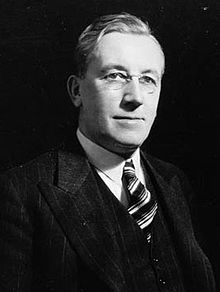Major James Coldwell
|
The Honourable Major James Coldwell PC, CC |
|
|---|---|
 |
|
| 2nd Leader of the Co-operative Commonwealth Federation | |
|
In office 1942–1960 |
|
| Preceded by | J. S. Woodsworth |
| Succeeded by | Hazen Argue |
| 2nd National Chairman of the Co-operative Commonwealth Federation | |
|
In office 1938–1942 |
|
| Preceded by | J. S. Woodsworth |
| Succeeded by | F. R. Scott |
| Member of the House of Commons of Canada | |
|
In office 1935 – 1958 |
|
| Preceded by | new constituency |
| Succeeded by | Clarence Owen Cooper |
| Constituency | Rosetown—Biggar |
| 1st National Secretary of the Co-operative Commonwealth Federation | |
|
In office 1934–1936 |
|
| Preceded by | new office |
| Succeeded by | David Lewis |
| 1st Leader of the Saskatchewan Co-operative Commonwealth Federation | |
|
In office 1932–1936 |
|
| Preceded by | new office |
| Succeeded by | George Hara Williams |
| Member of the Regina City Council | |
|
In office 1922–1932 |
|
| Personal details | |
| Born |
Major James William Coldwell December 2, 1888 Seaton, England |
| Died | August 25, 1974 (aged 85) Ottawa |
| Political party |
Co-operative Commonwealth Federation New Democratic Party |
| Spouse(s) | Nora Gertrude Dunsford Coldwell |
| Children | 2 |
| Residence | Ottawa, Ontario |
| Occupation | Author, principal, teacher |
| Religion | Anglicanism |
Major James William Coldwell, PC CC (December 2, 1888 – August 25, 1974), usually known as M.J. (Major was his first name, not a military title), was a Canadian social democratic politician, and leader of the Co-operative Commonwealth Federation (CCF) party from 1942 to 1960. He was born in England, and immigrated to Canada in 1910. Prior to his political career, he was an educator and union activist. In 1935 he was elected to the Canadian House of Commons, representing the Rosetown—Biggar electoral district. He would be re-elected five more times until he was defeated in the 1958 Diefenbaker sweep. He was the CCF's first national secretary in 1934, and became its national leader upon the death of J. S. Woodsworth in 1942. He remained as its leader until 1960, when there was a parliamentary caucus revolt against him. When the CCF was disbanded 1961, he joined its successor party, the NDP. He is mainly remembered for helping to introduce "welfare state" policies to Canada, by persuading the Canadian government to introduce an Old Age Security programme, and child benefits during the mid-1940s. Coldwell turned down several offers to cross the floor and join the governing Liberal Party of Canada, including one offer that eventually would have made him the Prime Minister of Canada. After his defeat in 1958, he was offered a Senate appointment, but declined it as well. He became a member of the Privy Council in 1964 and in 1967 became one of the initial inductees into the Order of Canada. After suffering two heart attacks on the same day, he died in Ottawa at the age of 85.
Coldwell was born in Seaton, England on December 2, 1888. While Coldwell attended Exeter University (at the time called Royal Albert Memorial College), he met Norah Gertrude Dunsford in 1907, and in December 1909, they became engaged. Norah was born in 1888, and was the daughter of a wealthy newspaper proprietor, John Thomas Dunsford. Coldwell left to teach in Canada's Prairie provinces in 1910 and came back to the United Kingdom during his summer break in 1912. They were married at the Wembdon Church in Bridgwater, Somerset on July 22. They honeymooned in England for two weeks, before they sailed to Canada for him to continue teaching in Sedley, Saskatchewan.
...
Wikipedia
